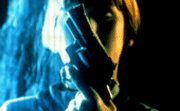While the highly stylized, oneiric sequences in Sound and Fury portend Jean-Claude Brisseau’s preoccupation with erotic imagery, his visceral, unsentimental portrait of childhood alienation nevertheless aligns closer to the naturalism of Ken Loach’s Kes and Jean Eustache’s Mes petites amoureuses than the surrealism of his later films. Indeed, Bruno’s (Vincent Gasperitsch) initiation into his new life in the suburbs proves to be as mythological as the shrouded women that occupy his waking dreams, greeted by a real-life trial by fire as he runs a gauntlet of burning doormats that have been set ablaze by his reckless neighbor, Jean-Roger (François Négret). Arriving at an empty apartment with a bird in tow following the death of his guardian, Bruno’s aimlessness is further compounded by his mother’s frequent absences from home (communicating with him only through assorted notes that she leaves behind), a sense of isolation that further draws him to Bruno and his equally dysfunctional, yet fiercely devoted family. Another surrogate also surfaces in Bruno’s life. Struggling to keep up with his grade level, Bruno’s idealistic teacher (Fabienne Babe) offers to tutor him after school and becomes a neutralizing influence to Jean-Roger’s increasingly destructive antics. But when Jean-Roger’s household is upended by the news of his older brother’s (Thierry Helene) decision to move out, Bruno once again finds himself caught up in the entropy of his friend’s unraveling life, torn between a need to belong and to be loved. By relegating his now familiar (and arguably indulgent) images of ecstatic angels into the periphery, Sound and Fury is perhaps Brisseau’s most accessible and honest film, retaining the intriguing, provocative nature of his body of work without the distraction of overripe sexuality that has diluted his later films (most notably Secret Things and Exterminating Angels).
© Acquarello 2010. All rights reserved.
